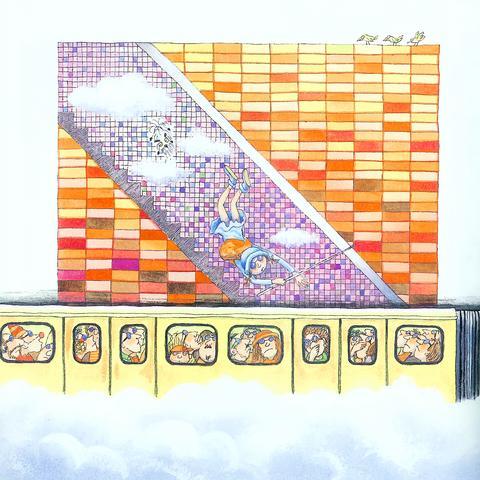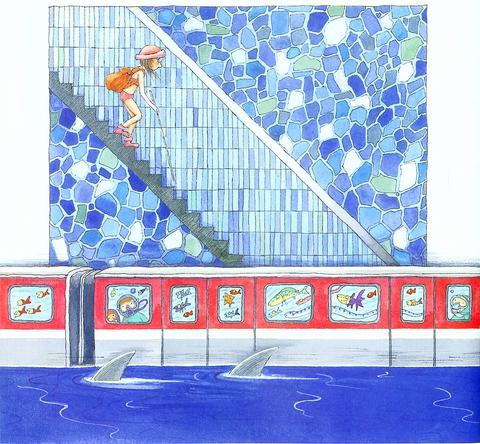A combination of best-selling illustrated book author Jimmy Liao (幾米), theater director Miguel Li (黎煥雄) and film star Wing Fan (范植偉) has ensured the success of Sound of Colors -- Jimmy's Subway Book, a Musical Journey (地下鐵), the latest play from Taipei's Creative Society
(創
Jimmy Liao's first stage presentation of one of his books -- which are popular in Taiwan, Hong Kong and China -- has created such a buzz that tickets for the six performances at the National Theater in Taipei, started yesterday, sold out two weeks ago.

PHOTO COURTESY OF LOCUS PUBLISHING
"I have been anticipating this for so long, like the audience, and want to see the result. I want to see the crew really bring out that flower in my heart," said Liao, in language that is characteristic of his books.
In the large ballet rehearsal room at the National Theater, the crew for Sound of Colors repeatedly rehearsed each scene. Chen Chien-chi (陳建騏), the composer, directed the musicians through the jolly and slightly sentimental songs, creating an ambience for the setting, which is imaginary subway stations.
Pop singer Chen Chi-chen (陳綺貞) plays the protagonist, a young blind girl who takes a bold adventure, going alone, into the unknown world of subway stations. Chen, putting on her props -- shades and a walking stick -- moved toward the center of the rehearsal room. Wing Fan, who plays the mysterious man in black, stayed in a corner, reciting his lines. Then, a group of singers and dancers, in their colorful costumes showed up at the front of the stage, while director Li called on his actors to position themselves. "Wing, now you take position!"

PHOTO COURTESY OF LOCUS PUBLISHING
Published three years ago, Sound of Colors is one of Jimmy Liao's most popular books. It is the second time one of Liao's stories has been adapted to a different media. A Chance of Sunshine (向左轉, 向右轉) was adapted into the movie Turn Left, Turn Right by Hong Kong director Jonny To (杜琪峰). The Warner Brothers group invested in the movie, which is scheduled to be released in
September.
The story of Sound of Colors describes a young lady who lost her eyesight in early childhood and decides to take a subway trip to her 15th birthday party, by walking aimlessly through different stations. In Liao's delicate, colorful and imaginary landscape, the girl's adventure turns out to be a journey that tests her courage and attitude toward life.

PHOTO COURTESY OF LOCUS PUBLISHING
"What can be seen, and what cannot be seen, and what is the departure and what is the destination all become unclear as the play unfolds," Liao said.
"The inspiration I had for the book was based on many of my memories of traveling. I've been to different subway stations and seen different scenes, all shifting and fleeting," Liao said.
"In the story, the blind girl could not see the world's scenery, but imagination has made her world broader and her life more free."
Liao said when he created Sound of Colors, he tried to present the life journey like a play, which happened in acts. So, he said, he was happy to see the book actually become a play. The director is Liao's good friend, director Miguel Li. As a music producer he has produced four albums based on the illustrated works of Liao. He said Jimmy's unique sensitivity and his clear and simple language, allied to the solid and original pictures, created a glamorous image. "This is the main reason why he [Liao] wanted to adapt the book into a play."
To give Jimmy Liao's prose style a clearer dramatic narrative, Li has created more roles for the play, including the mysterious angel in black played by Wing Fan, the girl's father, a gardener and a railway worker. There will also be penguins, elephants, butterflies, Death and a toy soldier with minor parts.
"Basically, the play is something between the fairytale Alice in Wonderland and the black existentialism of novelist Franz Kafka," Li said. "I will not start from the perspective of the blind girl, instead, I will come from the angle of the father, who views life in terms of uncertainty."
In terms of style, Li has made Sound of Colors into a hybrid of musical and play, which has given give pop singers Chen Chi-chen and Huang Shin-shin (黃心心) roles to play. As for Wing Fan, the up-and-coming star who gained fame in the film Best of Times (美麗時光) and Crystal Boys (孽子),this will be his maiden singing performance.
"I'm a bit nervous, but the whole process is a lot of fun," he said.
Wing Fan, who last year joined Wong Kar-wai's (王家衛) Jet Tone Production Co (澤東電影公司) and will feature in Wong's future films. His good looks and brooding personality is said to be the main reason Wong signed him up for Jet Tone. But in the play, director Li finds another trait in Wing Fan. "He is not that melancholy. In rehearsal, he is like a naughty kid, jumping around and talking a lot more.
Having overseen the rehearsal, Liao said he was excited about the play, and having Xia Yu (夏宇) -- the famous poet -- write the lyrics for the songs. "I'm just very satisfied," he said.

Towering high above Taiwan’s capital city at 508 meters, Taipei 101 dominates the skyline. The earthquake-proof skyscraper of steel and glass has captured the imagination of professional rock climber Alex Honnold for more than a decade. Tomorrow morning, he will climb it in his signature free solo style — without ropes or protective equipment. And Netflix will broadcast it — live. The event’s announcement has drawn both excitement and trepidation, as well as some concerns over the ethical implications of attempting such a high-risk endeavor on live broadcast. Many have questioned Honnold’s desire to continues his free-solo climbs now that he’s a

As Taiwan’s second most populous city, Taichung looms large in the electoral map. Taiwanese political commentators describe it — along with neighboring Changhua County — as Taiwan’s “swing states” (搖擺州), which is a curious direct borrowing from American election terminology. In the early post-Martial Law era, Taichung was referred to as a “desert of democracy” because while the Democratic Progressive Party (DPP) was winning elections in the north and south, Taichung remained staunchly loyal to the Chinese Nationalist Party (KMT). That changed over time, but in both Changhua and Taichung, the DPP still suffers from a “one-term curse,” with the

Jan. 26 to Feb. 1 Nearly 90 years after it was last recorded, the Basay language was taught in a classroom for the first time in September last year. Over the following three months, students learned its sounds along with the customs and folktales of the Ketagalan people, who once spoke it across northern Taiwan. Although each Ketagalan settlement had its own language, Basay functioned as a common trade language. By the late 19th century, it had largely fallen out of daily use as speakers shifted to Hoklo (commonly known as Taiwanese), surviving only in fragments remembered by the elderly. In

William Liu (劉家君) moved to Kaohsiung from Nantou to live with his boyfriend Reg Hong (洪嘉佑). “In Nantou, people do not support gay rights at all and never even talk about it. Living here made me optimistic and made me realize how much I can express myself,” Liu tells the Taipei Times. Hong and his friend Cony Hsieh (謝昀希) are both active in several LGBT groups and organizations in Kaohsiung. They were among the people behind the city’s 16th Pride event in November last year, which gathered over 35,000 people. Along with others, they clearly see Kaohsiung as the nexus of LGBT rights.